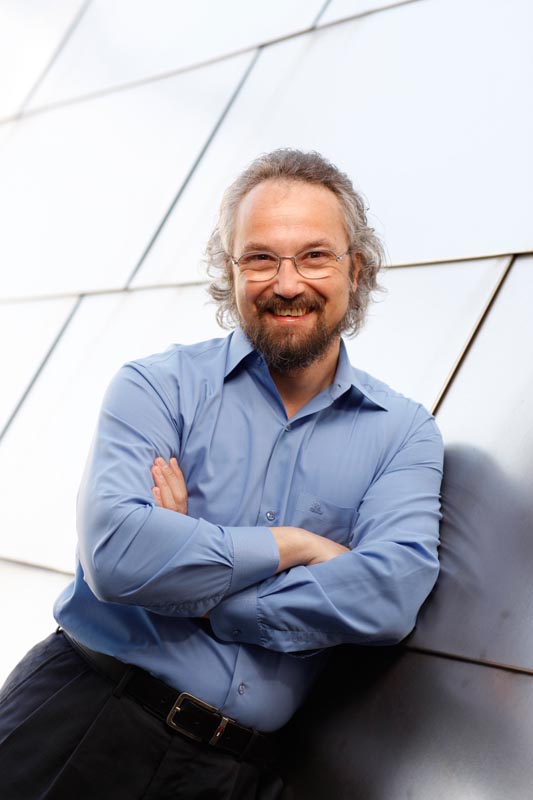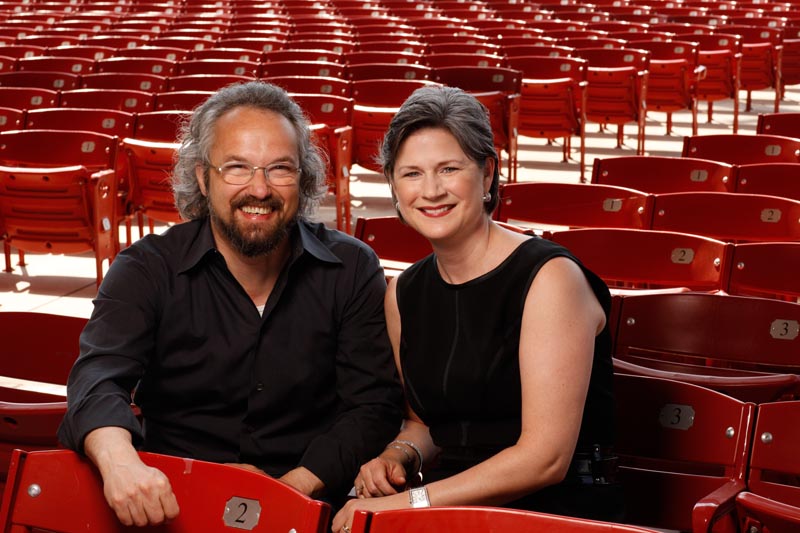Kalmar set to open his tenth season with the Grant Park Music Festival
On Wednesday night, Carlos Kalmar will give the downbeat to Berlioz’s Roman Carnival Overture, kicking off the Grant Park Music Festival’s 76th season and the conductor’s tenth anniversary leading Chicago’s free summer music series.
At an economically straitened time when many classical organizations appear to be racing back to standard populist fare, Kalmar and the Grant Park Orchestra will once again serve up a distinctive mix with the offbeat and ambitious repertoire that has made the Pritzker Pavilion the place to be for discerning music fans in the summer months.
“All this is the result of the collaboration between Jim Palermo and myself,” said Kalmar at the music festival offices, speaking of the former general director, his partner in Grant Park artistic planning for the past decade.
“But I’m not sure when Jim hired me to be principal conductor of the festival that we would wind up being champions of what we are,” he adds. “I would say the first few years we were even more eclectic than we are now.”
Certainly, the 2010 season largely continues the same quirkily adventurous spirit of previous seasons since Kalmar became the festival’s principal conductor in 2000. Among the most intriguing events this summer are the collaborations with the superb Grant Park Chorus, led by chorusmaster Christopher Bell.
Beethoven’s mighty Mass in C will be heard this opening weekend on a program that also includes Haydn’s Te Deum and Hindemith’s Nobillisima Visione. Michael Tippett’s anti-war oratorio, A Child of Our Time is to be performed July 23 and 24. Also a real rarity, Canticle of the Sun by Chicago composer Leo Sowerby, will be presented June 25 and 26, as part of a program of Pulitzer Prize-winning American music.
Bell’s choristers will also be featured in Dvorak’s Requiem August 13 and 14, and an a cappella program of French music July 6 and 8. The season will close with Kalmar leading the orchestra, chorus and soloists in Mahler’s epic Resurrection Symphony August 20 and 21.
To be sure, there will also be evenings of lighter works such as Wednesday’s opening program of Berlioz, Vivaldi and Respighi, a night with cabaret ensemble Pink Martini June 23, and a screening of the film Planet Earth July 21.
Kalmar believes doing a mix of standard works and rarely encountered rep is a better deal overall for both audiences and the musicians, due to the relentless accelerating treadmill of the summer concert schedule.
“First of all, it’s very tough on the orchestra if you’re constantly offering new things for them to learn because we have a schedule that is complete insanity,” says Kalmar.
“And if we only played unknown or rare works, we wouldn’t have the audiences we do. Now we’ve integrated a little more the standard pieces, and I consider the programs probably the best mix that we can have.”
Last summer the Grant Park Music Festival offered some of the year’s most memorable evenings, including Shostakovich’s Song of the Forests, Elgar’s Dream of Gerontius, a program of 1930s American rarities, and the world premiere of Michael Torke’s Plans, marking the centennial of Daniel Burnham’s Plan of Chicago.
“I was happy for so many reasons with last season but especially the Gerontius,” says Kalmar of the acclaimed performances of Elgar’s glorious oratorio, “And, considering the [limited] rehearsal time, I thought the Mahler 9 was pretty special.”
Asked what he considers his greatest achievements over the past decade at the helm of the Grant Park Orchestra, Kalmar is quick to credit Palermo and his musician colleagues. “I never considered it my greatest achievement. I would say our greatest achievement was actually to put this festival on a very different map.”
“Chicago is a very rich city in terms of what goes on culturally and with great institutions of very high quality. That being said, I think it’s fair game to say that the Grant Park Music Festival is now very different than it was.”
The most obvious change is the orchestra’s gleaming new home, the Pritzer Pavilion, which opened in 2004 “We have probably one of the best outdoor facilities in the world. It’s not only a wonderful piece of art but it also works very well as a great acoustical environment within the limitations of being in the middle of the city with traffic noise and all of that.”
The other evolution is the improvement in the musicianship of the Grant Park Orchestra, which has grown into a much more cohesive and virtuosic ensemble than that Kalmar inherited a decade ago. “Undoubtedly, the level of playing is something that we have all achieved together. This was not the same orchestra by a long shot then as it is now.”
The Grant Park musicians are quick to give their conductor credit for his work in building the festival both artistically and from a public relations standpoint.
“Carlos has an inexhaustible supply of energy and the dedication to putting on the highest quality of concerts possible,” says violinist Jeremy Black, the orchestra’s concertmaster. “He has an incredible amount of focus and drive, and he comes up with programs that challenge an audience and attract people.”
Black also notes that news of the Great Park Orchestra has traveled to the greater music world beyond downtown Chicago. “It seems like more musicians are auditioning now to play with us and we’re drawing a wider variety and a higher level of players.”
Principal clarinetist Charlene Zimmerman, a 33-year veteran of the orchestra, said that Kalmar’s early appearance with the orchestra made the musicians sit up and take notice. “He did a Brahms One with us before he was hired that was just sublime,” she said. “He’s really steeped in the German tradition and he just did things with that piece that aren’t usually done.”
“I think he’s just been a great believer in the orchestra. He programs pieces that make us sound great, and he’s done a lot for the choral end of the festival as well.”
Kalmar points out that a good part of the growth of the Grant Park Music Festival is due to Christopher Bell, director of the Grant Park Chorus, who came aboard in 2001.“This is now one of the top choruses in the country,” says Kalmar. “Whenever I am in front of the orchestra and the chorus together, I’m just so proud of him.”
At a time when many leading classical music organizations seem to have little if any interest in programming American music, Kalmar has been exemplary in bringing homegrown works to Chicago audiences, including last year’s Torke premiere and works by John Alden Carpenter, William Grant Still and Leo Sowerby. “We feel we need to do something for American music,” says Kalmar. “I think we are filling a gap and we are creating our own niche by which we can be identified.”
This season, Kalmar will lead a Harris Theater evening of Pulitzer Prize-winning works including Copland’s Appalachian Spring with William Schuman’s A Free Song, and Canticle of the Sun by Chicago composer Leo Sowerby, a program Kalmar hopes to record and release. “These are pieces that were all written in the 1940s. I doubt that the Schuman and Sowerby have been played more than a few times ever since. And they really deserve to be heard.”
Asked if there were any particular nights that stand out over his decade helming the festival, the Uruguayan-born Austrian conductor said he has a hard time recalling due to the hectic rehearsal and performance schedule. “It’s so intense and fast-paced and I need to concentrate so much on what is happening this week and the next, that I just lose it a little bit.”
Still, there are some highlights that Kalmar remembers distinctly: an “eye-opening” performance of John Corigliano’s Symphony No. 1; the Dvorak Stabat Mater, “a phenomenal piece,” and a deeply affecting take on Brahms’ German Requiem. “That was a moment of glory,” says Kalmar, smiling at the memory.
Kalmar also includes last year’s performance of Elgar’s Dream of Gerontius. “I wouldn’t say it’s a piece you should hear regularly but it’s definitely a piece you should hear more than once in a lifetime. It has a real point.”
An impressive practical podium quality of Kalmar’s is his Zen-like ability to tune out the sirens, traffic noise, avian calls and assorted al fresco disturbances that are an inevitable component of a classical music festival in downtown Chicago.
“It was much worse when we were at Petrillo,” says Kalmar of the pre-Pritzker band shell facing east off of Michigan Avenue. “Now we are a little more protected.” He recalls when they performed John Adams’ 9-11 work, On the Transmigration of Souls, the street noise enhanced the evocative music. “That was the one time when the ambulance sirens actually added to the performance.”
With Elizabeth Hurley coming aboard as executive director this year, Kalmar is optimistic that the artistic success of the festival will continue with Hurley’s expertise in development, honed at the Met and the Chicago Symphony Orchestra, helping to shore up the festival’s financial portfolio.
“I think it will be very successful and it will also be very different,” says Kalmar, noting that Hurley will concentrate on the administrative and development side and he will now be solely in charge of artistic matters, a responsibility he shared previously with Palermo. “Elizabeth is very experienced in the development area and worked at a very high level at the CSO and the Met. She brings that to the table and we really appreciate that.”
With two more years left on his contract, Kalmar said his wish list of repertoire is getting shorter, but there are still works he would like to bring to Grant Park audiences: Shostakovich’s Tenth Symphony, Dvorak’s late tone poems based on Erben’s grisly folk tales, Franz Schmidt’s Book of the Seven Seals and, perhaps most intriguingly, Honegger’s oratorio, Jeanne D’Arc Au Bûcher.
Kalmar is currently in his seventh season as music director of the Oregon Symphony, and has recently taken on a new assignment as principal conductor of Madrid’s Orquestra Sinfónica de Radio Televisión Española, beginning in 2011.
Still, the conductor says his Grant Park association remains a singular partnership amid his far-flung musical posts. “We’ve done so much and it has been so rewarding,” says Kalmar. “The only place I can imagine being for 15 years is here.”
The Grant Park Music Festival opens its season 6:30 p.m. Wednesday at the Pritzker Pavilion with Carlos Kalmar leading the Grant Park Orchestra in Berlioz’s Roman Carnival Overture, Respighi’s Feste Romane and Vivaldi’s Four Seasons with soloist Elina Vähälä. http://grantparkmusicfestival.com.
Posted in Uncategorized





Posted Jun 14, 2010 at 9:18 am by Plush
It is surely true that the Grant Park Orchestra has grown under Kalmar.
He has done a great job. So has Bell.
Sadly this season, the orchestra has cancelled its radio broadcasts. These offered the orchestra to an even wider public in Chicago and on internet radio.
Posted Jun 19, 2010 at 8:05 am by Laura
There isn’t enough money in the budget for both radio broadcasts and recording projects. The chorus and orchestra are scheduled to record a cd next week, which will reach a wide audience.
Posted Jun 28, 2010 at 6:50 am by Laura
WFMT will do a live broadcast of the GPMF concert on Wednesday, June 30th.